HISTORY:
Rocket originates from the Mediterranean and North Africa, where it was recorded as early as the 4th century BC. Originally considered a weed, it was first cultivated in antiquity and used for both culinary and medicinal purposes. Always a staple in Italy, rocket saw a rise and fall in popularity in other parts of the world over the centuries. But in the 1980s, it suddenly became the fashionable ingredient in Britain and America, and now it’s practically unavoidable.
Although we mostly think of rocket as a salad leaf, it actually belongs to the Brassica family: the same one as cabbage and mustard seeds. Which makes a lot of sense when you consider its peppery taste!
FUN FACTS:
Rocket has been around since ancient times, long before it showed up in fancy café salads. In Antiquity, it was believed to be an aphrodisiac (yes, again! I feel like I say this every week). Apparently, early Christians disapproved of this reputation, and rocket was even banned from monastery gardens.
Meanwhile, as we learned last week, lettuce was considered to have the opposite effect… which led to some amusing salad combinations meant to “balance things out”. Personally, I suspect it had more to do with balancing flavour than libido.
Beyond its love life, rocket was used to treat stomach ailments and, according to Virgil, to “reawaken Venus”, goddess of love. Nature’s Viagra, if you will.
Although Europeans and Americans mostly eat the leaves, the flowers and seeds are also edible. In India, the seeds are pressed into oil for cooking and preserving vegetables.
As for the name? In the UK we say rocket, in the US they say arugula — but both words come from the same Latin root: Eruca sativa. Eruca became ruca, which became roquette in French and gave us “rocket”. In Italy, ruca turned into ruccola, which Italian Americans eventually morphed into “arugula”.
HOW TO COOK ROCKET:
Raw:
Rocket adds a mustardy, peppery kick to any salad. Some of my favourite combinations:
Rocket, roasted fig & goat’s cheese
Rocket, strawberry & burrata
Rocket, steak & roasted beetroot
Rocket, avocado, grapefruit & prawns
Rocket, butterhead lettuce & walnuts with French vinaigrette
Rocket, Parma ham, ricotta, sun-dried tomato & Parmesan in a focaccia sandwich
You can also blend rocket with garlic, pine nuts, Parmesan and extra virgin olive oil (EVOO) for a punchy homemade pesto.
Cooked:
Rocket loses much of its bite when cooked, so it’s best added at the last minute.
Wilt it into pasta sauces like tomato, tonnato or al limone
Use it in place of spinach in stews, stir-fries or as a quick side with garlic, lemon and EVOO
Flavour Pairings:
Rocket pairs especially well with:
Cheese: hard cheeses, blue cheese, goat’s cheese
Vegetables: beetroot, parsnip, tomato
Fruit: grapefruit and other citrus; figs, peaches, apricots, strawberries, pomegranate
Nuts: especially walnuts
Protein: shellfish, oily fish, beef, chicken
Other favourites: honey, anything smoked
Fancy trying some of my favourite rocket recipes?
Spring toast with whipped cottage cheese, peas & rocket: recipe below
Radish, rocket and asparagus tart: recipe coming to subscribers next week
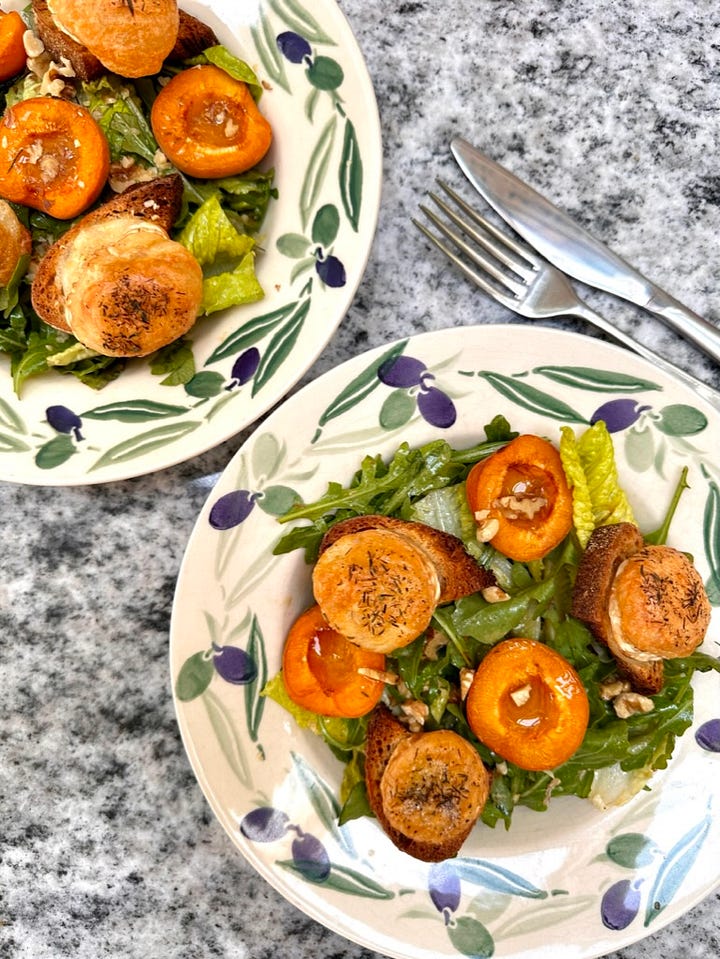
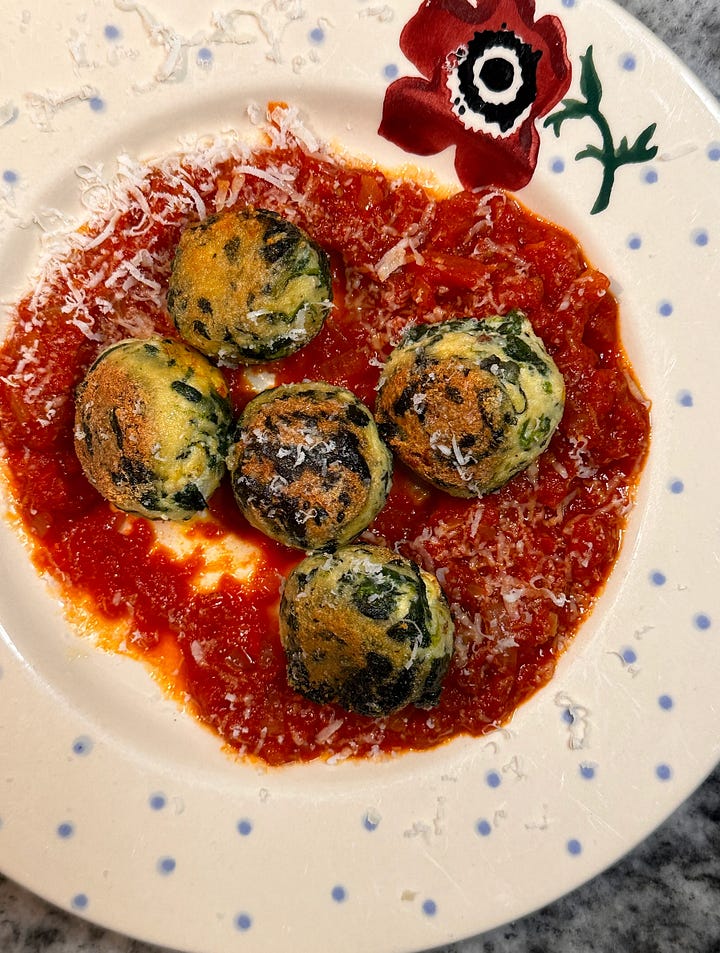
MOOD FOOD - HAPPY:
Like other brassicas (a family that includes the likes of kale and broccoli), rocket contains natural compounds that convert into isothiocyanates.
These compounds improve our body's detoxification pathways, making it easier to excrete toxins and carcinogens such as cigarette smoke and pollutants. They have bactericidal properties towards some harmful bacteria, helping our good bacteria thrive. Finally, they have been linked to a reduced risk of neurodegenerative diseases like Alzheimer’s and a a reduced risk of cancer, most likely due to promoting cell death (apoptosis) and regulating cell proliferation.
Unlike its more spotlight-hogging cousins though, rocket is usually eaten raw, which means those beneficial compounds remain more readily available. So next time you toss a handful of leaves onto your plate, know you’re doing your brain and body a quiet little favour.
This week’s recipe:
Spring Toast with Whipped Cottage Cheese, Peas & Rocket
The ultimate healthy spring lunch:
Creamy whipped cottage cheese with parmesan, sweet peas, peppery rocket, and crunchy radishes on toasted sourdough. It’s easy, fresh, and packed with flavour, texture, and nutrients.
Not a cottage cheese fan? I get it. That’s why I whip it with parmesan until smooth and creamy. No lumps, just a rich, high-protein base that works beautifully on toast, topped with lovely seasonal veg. Find the full recipe below.
Ingredients (1 portion):
Spring toast recipe:
100g light cottage cheese
10g parmesan
10ml extra virgin olive oil (EVOO)
3 radishes
80g frozen peas
30g rocket
Balsamic glaze
1 slice sourdough
Parmesan, for garnish
Sea salt
Black pepper
EVOO, for finishing
Optional: anchovy fillets or fresh mint, for garnish
Method:
Add the cottage cheese, 10g grated parmesan, 10ml EVOO and a pinch of salt to a food processor. Blitz until smooth.
Thinly slice the radishes and season with a pinch of flaky sea salt.
Microwave the frozen peas for 1 minute on full power, then rinse under cold water to cool. Season with flaky sea salt and a drizzle of EVOO.
Dress the rocket with EVOO, balsamic glaze and a little salt.
Toast the sourdough, then layer with the whipped cottage cheese, peas, dressed rocket and radish slices.
Finish with a final drizzle of EVOO and a grating of parmesan.
Take a bite of the best spring has to offer, bon appétit!
As always, if you have any questions about method, substitutes etc. feel free to send me a message!
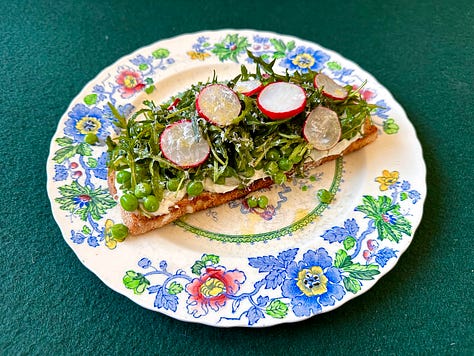

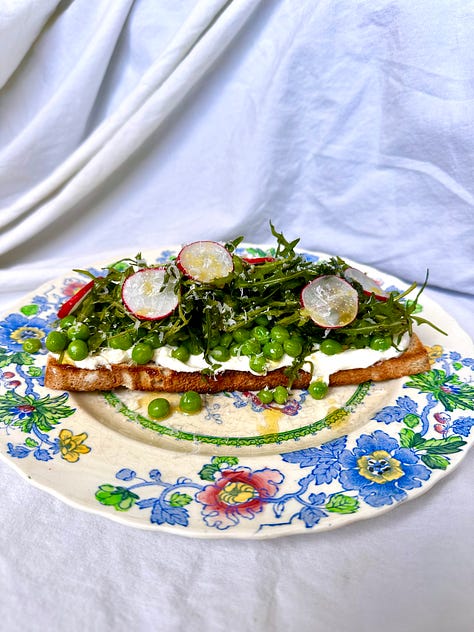



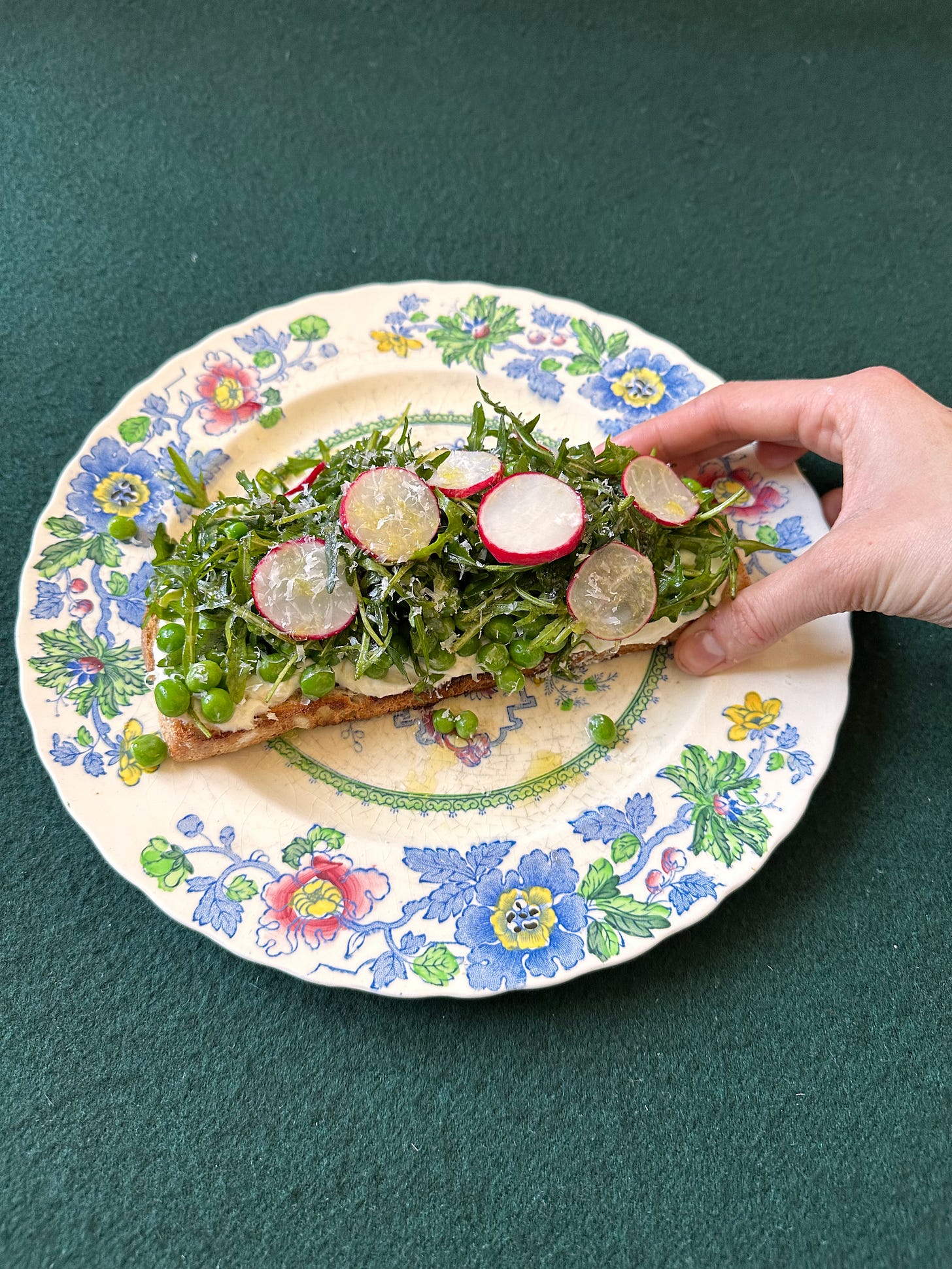
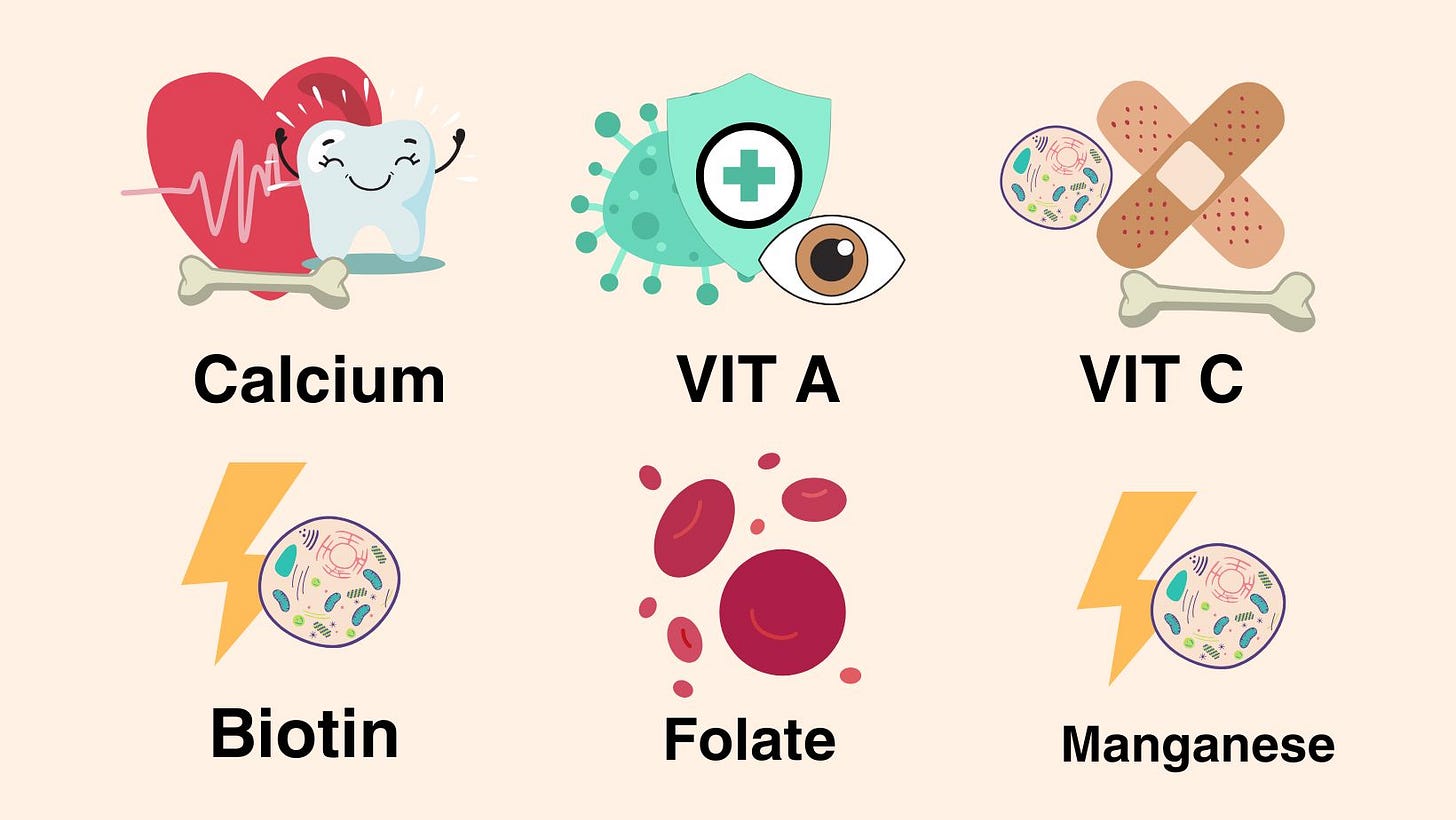
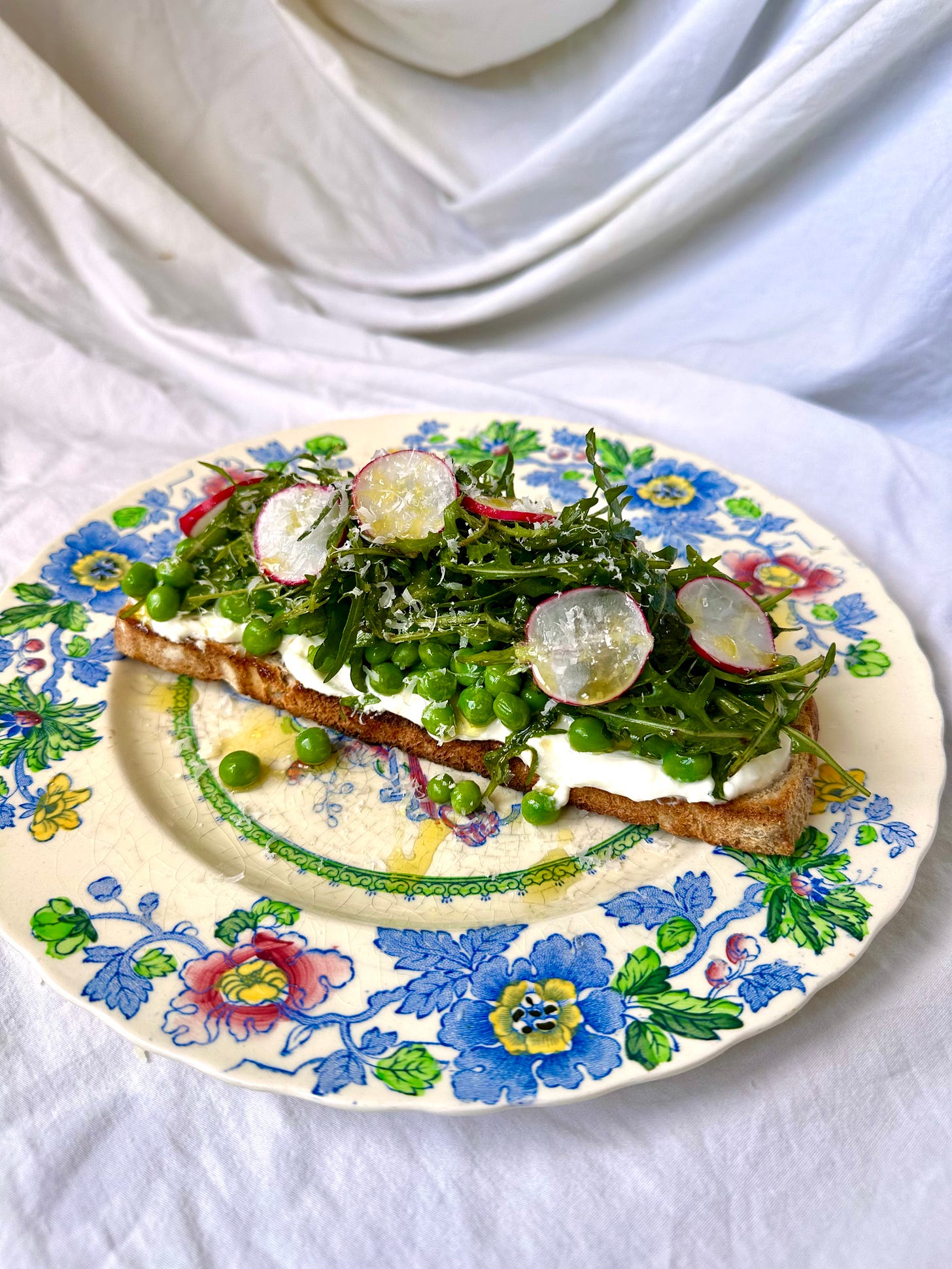
Morning; Just touching base! I had a moment this morning whilst waiting for Chess to leave for her cycle trip to La Tripe and looked through your post about rocket. I really like the way it is laid out. I think this would be an excellent format for a book!!! Generally I am not incentivised to think about food and am quickly overwhelmed by detail so I have to find the right moment to tune in. I am definitely going to try and use your weekly post to gently try new things out. The pear and walnut salad will be my go to this week!